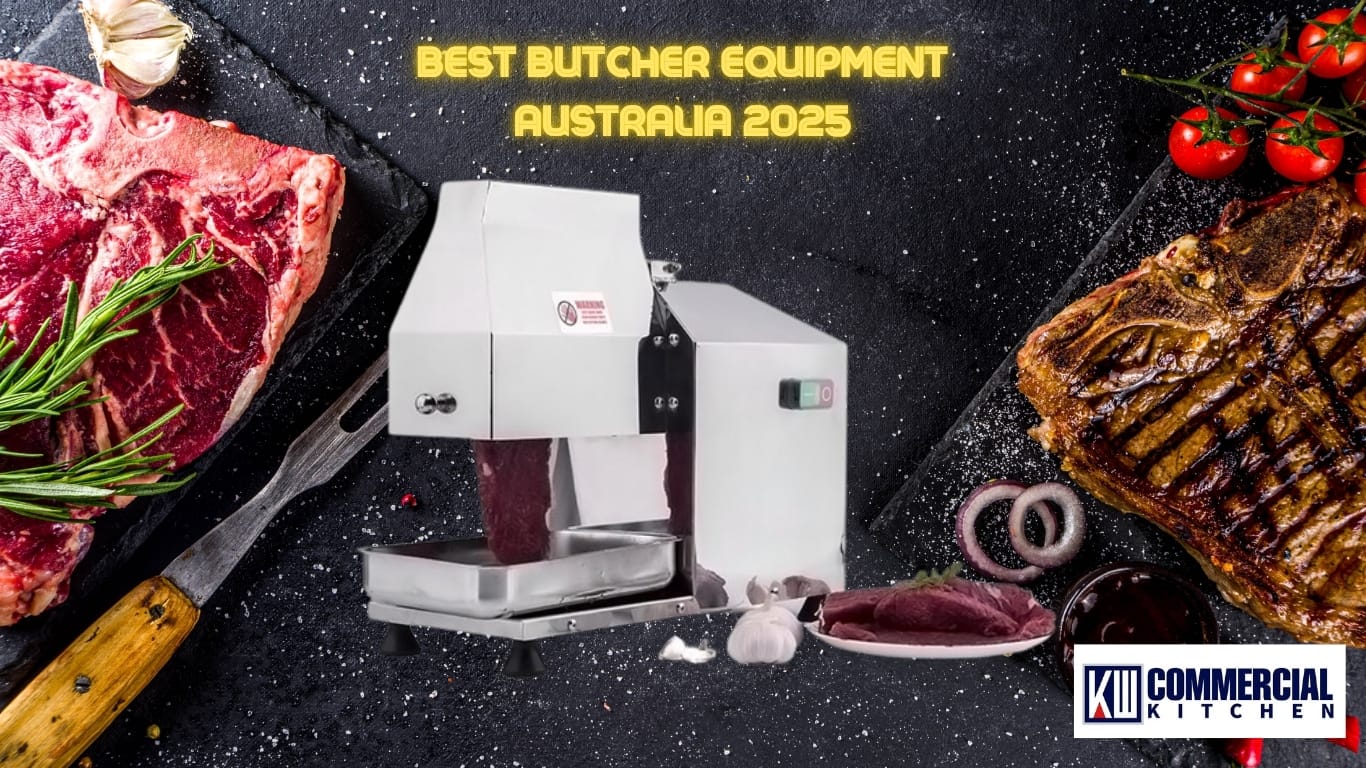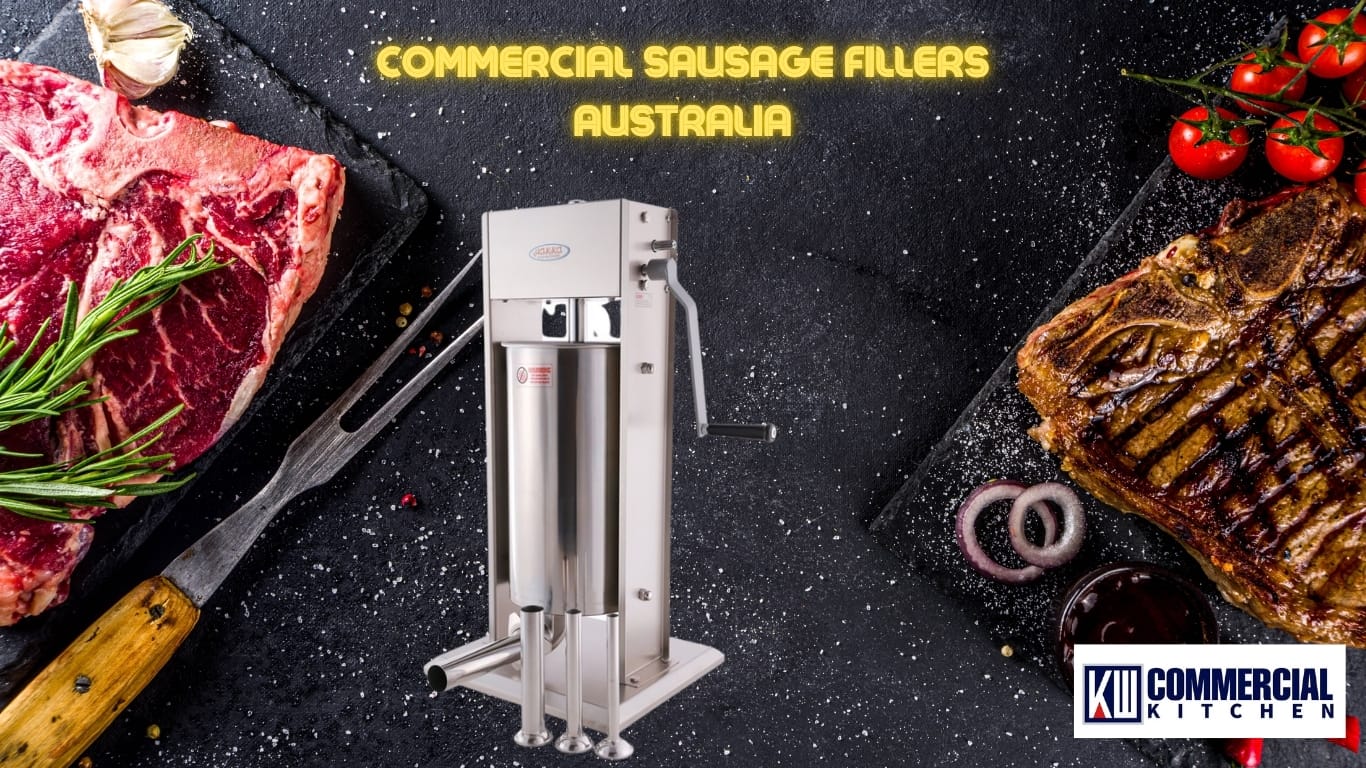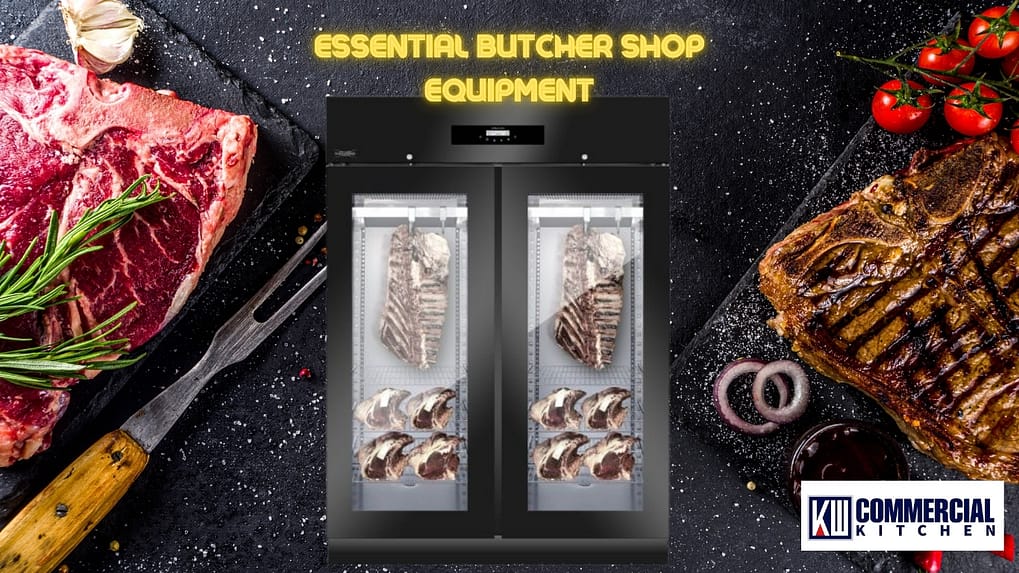Equip Your Butcher Shop for Success: Essential Meat Processing & Display Equipment in Australia (2025 Guide)
The butcher shop industry in Australia is highly competitive, with customers seeking top-quality meat, attractive displays, and impeccable hygiene standards. To stay ahead, investing in reliable and efficient butcher shop equipment is crucial. High-quality meat processing tools and professional display refrigeration units not only boost your shop’s efficiency but also significantly enhance customer satisfaction and increase sales.
At KW Commercial Kitchen, we specialize in providing Australian butcheries with equipment from trusted industry brands like FED, Matador, Grange, and Birko. Our comprehensive range includes meat slicers, bone saws, sausage fillers, refrigerated meat displays, and durable cold storage solutions—all tailored specifically for busy Australian butcher shops.
This guide will walk you through the process of selecting, operating, and maintaining the ideal equipment, ensuring your butchery consistently meets customer expectations and remains profitable year-round.
Must-Have Butcher Shop Equipment for Australian Businesses
Equipping your butcher shop with the right professional tools not only streamlines daily operations but also enhances product quality, food safety, and customer experience. Here’s an overview of essential butcher shop equipment every successful Australian butchery needs:
Meat Slicers
Commercial-grade meat slicers allow precise portion control and consistent slicing thickness, essential for deli meats, steaks, and cured products. Quality slicers from brands like FED and Birko offer durability, precision, and ease of cleaning, reducing wastage and labor costs significantly.
Bone Saws
Professional bone saws, such as those from Matador and Grange, are critical for safely and efficiently processing large carcasses into retail cuts. High-performance bone saws improve accuracy, productivity, and safety, making your operation more cost-effective and compliant with Australian health standards.
Sausage Fillers
Commercial sausage fillers help produce consistent, high-quality sausages quickly and hygienically. Reliable brands like Birko and Grange provide robust machines designed specifically for frequent, heavy-duty use, enabling your butchery to meet demand and expand product offerings.
Refrigerated Meat Displays
Attractive refrigerated display units from FED, Matador, and Bonvue ensure meat products remain fresh, appealing, and safely stored at FSANZ-compliant temperatures. Professionally presented meats directly boost customer interest, sales conversions, and overall satisfaction.
Heavy-Duty Cold Storage
Large-scale cold storage facilities maintain optimal freshness for bulk meat storage, essential for butchers managing high product turnover. Robust solutions from Grange and Thermaster provide reliable temperature control, energy efficiency, and compliance with stringent Australian food safety regulations, ensuring your products remain safe and of the highest quality.

Why Australian Butcher Shops Prefer KW Commercial Kitchen Equipment
Australian butcheries consistently choose KW Commercial Kitchen equipment for trusted, high-quality, and locally supported meat processing and display solutions. Our equipment range meets or exceeds stringent Food Standards Australia New Zealand (FSANZ) guidelines, ensuring compliance and peace of mind during regular council inspections.
KW Commercial’s butcher shop equipment is specifically designed for optimal energy efficiency and high performance in Australian conditions, reducing running costs and improving overall productivity. As locally sourced products, our equipment significantly simplifies ongoing maintenance and servicing requirements, with readily available spare parts and expert technicians based right here in Australia.
Additionally, KW Commercial Kitchen provides comprehensive pre-sales consultation and dedicated after-sales support, guiding your butchery through equipment selection, installation, and long-term maintenance. Australian butchers trust us for reliable, local support, backed by official product documentation, warranties, and expert advice—helping your business thrive in a competitive market.
How to Select the Right Equipment for Your Butcher Shop
Choosing the perfect butcher shop equipment can significantly impact your business’s efficiency, profitability, and compliance with Australian food safety standards. Here’s how to make informed decisions based on key considerations:
Key Factors to Consider
Budget & Value
Identify your budget and seek equipment offering the best balance of cost and quality. Investing in durable, commercial-grade tools from reputable Australian suppliers ensures long-term savings by reducing breakdowns and replacement costs.
Usage Frequency & Capacity
Understand your daily processing requirements clearly. Select equipment with capacities matching your shop’s workload, ensuring smooth operation during peak times. Heavy-duty options from brands like Matador and Grange support high-volume, frequent use effectively.
FSANZ Compliance (Food Safety)
Equipment must comply fully with Australian food safety regulations outlined by FSANZ. Ensure your selected equipment maintains consistent temperatures, allows thorough cleaning, and supports hygienic meat processing.
Energy & Water Efficiency
Selecting energy-efficient and water-saving equipment significantly reduces operational costs over time. Brands like FED and Grange offer sustainable designs, enabling Australian butcheries to minimize their environmental footprint while maximizing profitability.
Popular Butcher Equipment Brands Comparison
| Brand | Equipment Types | Durability | Energy Efficiency | FSANZ Compliance | Price Range (AUD) |
|---|---|---|---|---|---|
| FED | Displays, Slicers | High | Excellent | Yes | $500 – $20,000 |
| Matador | Bone Saws, Displays | Excellent | Good | Yes | $1,000 – $15,000 |
| Grange | Cold Storage, Fillers | Excellent | Excellent | Yes | $800 – $25,000 |
| Birko | Slicers, Fillers | High | Very Good | Yes | $600 – $12,000 |
By carefully considering these factors and brand comparisons, you can confidently select butcher equipment that precisely meets your Australian business’s unique needs and goals.

Efficient Operation and Maintenance of Your Butcher Shop Equipment
Proper usage and consistent maintenance of your butcher equipment ensure maximum efficiency, extended equipment lifespan, and strict compliance with Australian food safety standards. Follow these practical guidelines, aligned with FSANZ official food safety standards and manufacturer recommendations, to maintain reliable performance every day.
Daily Operational Guidelines for Butcher Shop Equipment
Correct Operating Procedures & Essential Tips
- Meat Slicers: Always check blade sharpness and settings before use. Slice meat at recommended thicknesses, regularly cleaning blades to prevent contamination as outlined in Safe Work Australia guidelines. Avoid excessive pressure, as this may cause motor strain or blade damage.
- Bone Saws: Verify blade tension and alignment daily. Ensure guards and safety mechanisms function correctly before use, as recommended by equipment manufacturers like Matador and Grange. Operate saws with consistent pressure, reducing the risk of blade breakage or overheating.
- Sausage Fillers: Lubricate moving parts regularly according to manufacturer guidelines provided in official manuals. Fill casings gradually, avoiding overfilling that can lead to equipment blockage or breakdowns. Thorough cleaning after each use is critical for hygiene compliance under NSW Food Authority standards.
- Refrigerated Meat Displays: Check temperature consistency daily (below 5°C according to FSANZ standards). Regularly clean seals and remove moisture or ice build-up to maintain optimal refrigeration efficiency, in line with the FSANZ Safe Food Australia Guide.
- Cold Storage Units: Verify temperature controls daily to maintain recommended storage conditions as per FSANZ standards. Regularly inspect and promptly repair damaged seals or hinges following manufacturer instructions provided by brands such as Grange or Thermaster.
Preventing Common Operational Issues
- Blockages & Clogs: Regularly inspect equipment, promptly removing meat residues to avoid internal blockages, following official maintenance procedures recommended by the equipment manufacturers.
- Blade Wear & Damage: Check blades frequently and sharpen or replace them according to guidelines detailed in the equipment’s official user manuals, ensuring precise and safe operation.
- Temperature Fluctuations: Conduct routine temperature checks using calibrated thermometers, complying with the FSANZ official food safety guidelines. Address any irregularities immediately to maintain food safety and regulatory compliance.
By following these daily guidelines, based on official Australian standards and manufacturer documents, butcheries across Australia can confidently provide consistently high-quality products while ensuring operational safety and efficiency.
Routine Maintenance Tips for Your Butcher Shop Equipment
Regular maintenance not only ensures optimal performance and food safety compliance but also prolongs your equipment’s lifespan, protecting your investment. Follow this clear schedule to keep your butcher shop operating smoothly.
Daily Maintenance Checklist
- Clean equipment surfaces thoroughly after each shift using mild food-safe detergents such as Jasol EC4 Sanitiser or Dominant Food & Kitchen Sanitiser, complying with FSANZ cleaning guidelines.
- Inspect refrigeration units daily for consistent temperatures (below 5°C) and remove any visible moisture or ice build-up immediately.
- Sanitize cutting blades, saws, and slicers after each use with approved food-grade sanitizers to ensure hygiene and prevent cross-contamination.
Weekly Maintenance Checklist
- Deep-clean refrigerated display cabinets, removing shelves and trays to thoroughly sanitize internal surfaces and door seals.
- Inspect blades on slicers and saws for sharpness, wear, or damage. Schedule sharpening or replacement as needed to maintain cutting precision and safety.
- Lubricate moving parts on sausage fillers and other mechanical equipment according to manufacturer instructions using food-safe lubricants.
Monthly Maintenance Checklist
- Check electrical cords, plugs, and controls for wear or damage. Arrange professional servicing for any issues identified.
- Deep-clean refrigeration condenser coils and vents with a soft brush or vacuum to enhance energy efficiency and refrigeration effectiveness.
- Inspect all equipment thoroughly for structural integrity, including seals, hinges, and moving parts. Replace any worn or damaged components promptly.
Utilizing gentle yet effective sanitizers and disinfectants that align with Australian food safety standards ensures hygiene without compromising equipment integrity. Regular maintenance combined with proper cleaning practices guarantees optimal performance, FSANZ compliance, and lasting reliability for your butcher shop.

Case Study: Successful Australian Butcher Shop in Perth, WA
Business Background: Located in Perth, Western Australia, Niu Beef Butchers is renowned locally for premium-quality beef products, specializing in high-quality dry-aged meats. Despite strong popularity, the shop faced challenges due to aging equipment and declining operational efficiency.
Challenges Faced:
- Outdated Equipment: Existing refrigeration and drying equipment struggled to maintain optimal conditions, negatively impacting product quality.
- Low Production Efficiency: Older machines caused frequent downtime, disrupted workflow, and increased maintenance costs.
- Increasing Energy Costs: Inefficient equipment led to higher electricity and water usage, elevating overhead costs significantly.
Implemented KW Commercial Solution:
To address these challenges, Niu Beef partnered with KW Commercial Kitchen, installing six units of the advanced Butcherquip BCA1001 Meat Dry-Aging Cabinets. These cabinets provided precise temperature and humidity control, significantly enhancing meat tenderness, flavor, and presentation. Additionally, the energy-efficient design of these units substantially reduced power consumption.
Outstanding Results:
- 15% Increase in Sales: Improved meat flavor and consistent quality attracted more customers, boosting overall sales noticeably.
- 20% Reduction in Operational Costs: Lower energy consumption and reduced downtime significantly cut monthly overhead expenses.
- 30% Improvement in Customer Satisfaction: Enhanced product quality and consistent availability of premium dry-aged beef led to overwhelmingly positive customer feedback.
Niu Beef’s experience demonstrates how investing in reliable, high-performance butcher shop equipment from KW Commercial Kitchen can transform business operations, increase profitability, and dramatically elevate customer experience.
Frequently Asked Questions (FAQs) – Butcher Shop Equipment
What is the ideal equipment setup for a small butcher shop?
For small butcher shops, the recommended equipment setup includes a compact meat slicer, a medium-capacity bone saw, a small to medium sausage filler, and a refrigerated meat display cabinet sized appropriately for your product volume. Adding a reliable cold storage solution will ensure safe, compliant storage for bulk meats.
What’s the difference between commercial and household meat slicers?
Commercial meat slicers are built specifically for heavy-duty daily use, offering greater precision, durability, and hygiene compliance. Household slicers, by contrast, are designed for occasional domestic use and lack the robustness, safety features, and easy cleaning capabilities required by Australian food safety regulations in professional butcheries.
How do I choose the right refrigerated meat display cabinet?
Select a refrigerated display cabinet based on daily product turnover, available space, and customer traffic. For high-volume shops, larger capacity units are essential. Smaller or boutique shops may opt for compact, energy-efficient units. Always ensure chosen units maintain temperatures below 5°C in compliance with FSANZ standards.
What are the serious consequences of poor equipment maintenance?
Neglecting proper equipment maintenance can lead to equipment breakdowns, higher energy bills, costly repairs, compromised food safety, regulatory penalties, and potentially severe damage to your shop’s reputation. Regular maintenance ensures compliance, safety, and sustained business performance.

Expert Advice & Authoritative Sources (EEAT)
Running a successful and compliant butcher shop in Australia requires strict adherence to official food safety standards outlined by Food Standards Australia New Zealand (FSANZ). Ensuring your equipment complies with these regulations not only prevents costly penalties but also enhances your business reputation and customer trust.
KW Commercial Kitchen offers professional guidance backed by extensive industry experience. Our local team understands Australian conditions and regulations intimately, providing detailed recommendations, training, and personalized support tailored to your specific business needs. We ensure you select, use, and maintain your butcher shop equipment according to manufacturer guidelines, optimizing safety and efficiency.
For comprehensive advice, equipment manuals, maintenance checklists, and best practices from leading brands including FED, Birko, Grange, and Matador, contact our experienced team directly. Our experts are available to help you maximize productivity, ensure food safety compliance, and achieve long-term operational success.
Conclusion & Call to Action
Investing in reliable, efficient butcher equipment is essential for the ongoing success and profitability of your Australian butchery. High-performance tools from trusted brands can significantly enhance meat processing efficiency, maintain strict hygiene standards, and increase customer satisfaction and loyalty.
KW Commercial Kitchen invites you to explore our specialized butcher equipment range and leverage our expert knowledge to select the best tools for your unique requirements. Don’t leave your success to chance—take action today.
Browse Our Complete Butcher Shop Equipment Range | Speak with Our Equipment Specialists for Personalized Advice

